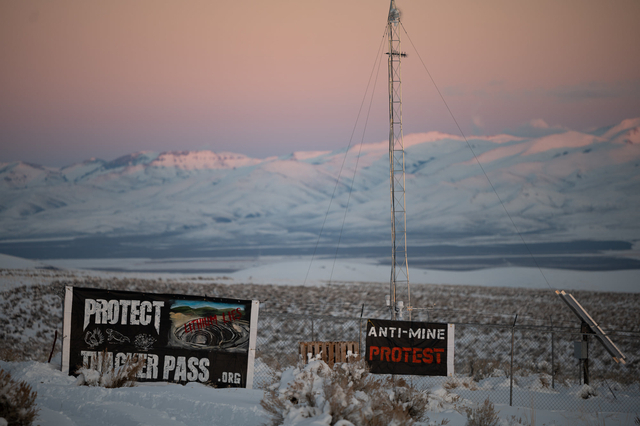
- Details
- By Darren Thompson
RENO, Nev.— Construction is underway on the highly contested Thacker Pass lithium mine in northern Nevada after a court ruled earlier this month against the tribes trying to stop the mine.
After U.S. District Court Judge Miranda M. Du ruled on Feb. 6 against conservation organizations, a local rancher, and several tribes who filed suit to stop the project, three separate federally recognized tribes filed an additional lawsuit on Feb. 16 in an attempt to stop construction of the mine.
On March 23, the court ruled against the tribes — the Reno-Sparks Indian Colony, Summit Lake Paiute Tribe, and the Burns Paiute Tribe — who argued that the Bureau of Land Management violated several laws when it permitted the mine to Lithium Americas on Jan. 15, 2021. The tribes also alleged that the mine’s permission violates their access to historically and culturally significant sites.
The Thacker Pass region is considered sacred by the tribes who call it “Peehee Mu’huh,” or Rotten Moon in the Paiute language because, in 1865, federal cavalry killed more than 30 men, women and children and then left their bodies to rot.
Judge Miranda Du said that access to the Thacker Pass region has been restricted for years because of authorized mining activity, and an argument that its restriction suddenly limits cultural rights is not valid.
The court previously rejected evidence presented by the Reno-Sparks Indian Colony and the Burn Paiute Tribe that a massacre occurred in the area. The two tribes presented written records and two eyewitness accounts of the slaughter.
The newest lawsuit also contended that the BLM misrepresented its claims that it consulted with tribes about potential impacts on historical and cultural sites near the mine project site.
“Our contention is with the largest lithium mine in the country and the expansion of the 40 plus other lithium claims proposed for the State of Nevada,” said Arlan Melendez, Chairman of the Reno-Sparks Indian Colony, in a statement on Feb. 17. “They should have notified all Tribes sooner. The Thacker Pass permitting process was not done correctly. BLM contends they have the discretion to decide who to notify or consult with. They only contacted three out of the 22 tribes who had significant ties to Thacker Pass.”
The three tribes behind the lawsuit said Thacker Pass should be listed on the National Register of Historic Places.
“Part of the Federal Government’s responsibility is to determine if a proposed mining project may adversely affect historic properties,” said Reno-Sparks Indian Colony’s Tribal Historic Preservation Officer Michon Eben in a statement. “Historic properties include Native American massacre sites. The BLM [Bureau of Land Management] failed in its trust responsibility to tribes and now our ancestor’s final resting place is currently being destroyed at Peehee Mu’huh.”
Lithium Nevada Corporation (LNC), the subsidiary of Lithium Americas, said in a news release that it began construction of what is being touted as the largest lithium mine in North America on Mar. 2. According to the company, lithium reserves at Thacker Pass can support the production of up to 1 million electric vehicles a year for up to 40 years. Production of materials could begin as soon as the end of 2026.
Lithium Americas did not provide a comment on the most recent ruling as of press time.
More Stories Like This
Gwich'in Tribal Governments Submit Comments Challenging Fish and Wildlife Service's Inadequate Environmental Review of Arctic Refuge Snow RoadRappahannock Tribe Challenges 9M-Gallon Water Plan
Feds release draft long-term plans for Colorado River management
Apache Leader Walks 60 Miles to Court Hearing That Will Decide Fate of Sacred Oak Flat
Rappahannock Tribe Raises Sovereignty and Environmental Concerns Over Caroline County Water Permit
Help us defend tribal sovereignty.
At Native News Online, our mission is rooted in telling the stories that strengthen sovereignty and uplift Indigenous voices — not just at year’s end, but every single day.
Because of your generosity last year, we were able to keep our reporters on the ground in tribal communities, at national gatherings and in the halls of Congress — covering the issues that matter most to Indian Country: sovereignty, culture, education, health and economic opportunity.
That support sustained us through a tough year in 2025. Now, as we look to the year ahead, we need your help right now to ensure warrior journalism remains strong — reporting that defends tribal sovereignty, amplifies Native truth, and holds power accountable.
 The stakes couldn't be higher. Your support keeps Native voices heard, Native stories told and Native sovereignty defended.
The stakes couldn't be higher. Your support keeps Native voices heard, Native stories told and Native sovereignty defended.
Stand with Warrior Journalism today.
Levi Rickert (Potawatomi), Editor & Publisher

